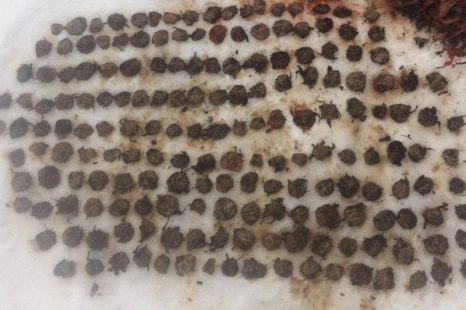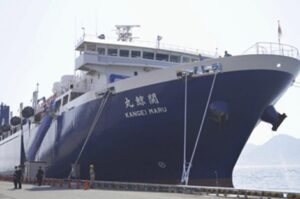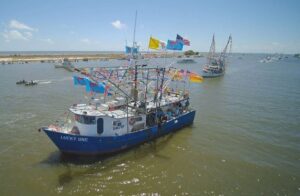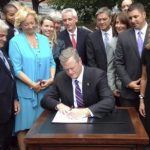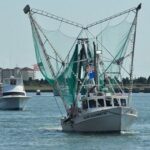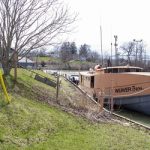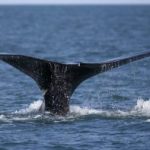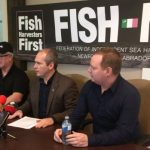Daily Archives: March 27, 2017
Mexican fishermen burn boat, demand environmentalists out
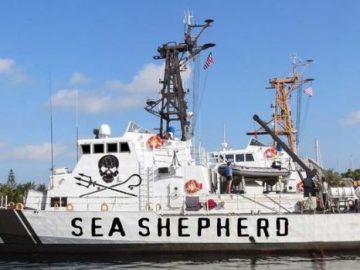 Dozens of fishermen have burned a boat as part of a threat to force out a ship operated by the Sea Shepherd Conservation Society in Mexico’s Gulf of California. Sea Shepherd has been removing illegal and abandoned nets that endanger the vaquita, the world’s smallest porpoise. Fishermen in the town of San Felipe painted the name of the Sea Shepherd on an empty, open fishing boat they burned Sunday. They threatened to remove the conservationists’ ship themselves if the government doesn’t. “Just as they are judging us fishermen, we will judge all the environmentalists,” said Sunshine Rodriguez, a leader of the local fishing cooperative in San Felipe, Baja California. “We aren’t going to just sit around.” A speaker at Sunday’s protest — which drew hundreds of onlookers and supporters at San Felipe’s main waterfront boulevard— said over a loudspeaker, “I’m giving them (the government) five days to get this boat out of our territorial waters, or we will do it ourselves. Read the story here 17:03
Dozens of fishermen have burned a boat as part of a threat to force out a ship operated by the Sea Shepherd Conservation Society in Mexico’s Gulf of California. Sea Shepherd has been removing illegal and abandoned nets that endanger the vaquita, the world’s smallest porpoise. Fishermen in the town of San Felipe painted the name of the Sea Shepherd on an empty, open fishing boat they burned Sunday. They threatened to remove the conservationists’ ship themselves if the government doesn’t. “Just as they are judging us fishermen, we will judge all the environmentalists,” said Sunshine Rodriguez, a leader of the local fishing cooperative in San Felipe, Baja California. “We aren’t going to just sit around.” A speaker at Sunday’s protest — which drew hundreds of onlookers and supporters at San Felipe’s main waterfront boulevard— said over a loudspeaker, “I’m giving them (the government) five days to get this boat out of our territorial waters, or we will do it ourselves. Read the story here 17:03
Editorial: Fishermen should look for smart ways to survive
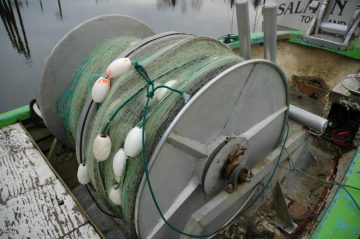 As spring Chinook salmon congregate in the ocean around the mouth of the Columbia River in anticipation of their ancient migration to upriver spawning grounds, this spring also sees a swirling conglomeration of politics in Oregon and Washington state over how to allocate salmon among different interests. In some ways nothing new, in other respects the fight over salmon is rising to a higher pitch. Increasingly involving elected leaders, the outcome is becoming even less predictable. Also unclear is where a majority of Oregon and Washington state voters stand on the issue. The key point of recent news in the matter is the Oregon Fish and Wildlife Commission’s unanimous vote to curtail gillnet fish harvests, altering an earlier decision that was more favorable to commercial fishermen. Bullied into the decision by Gov. Kate Brown, the commission backed away from its earlier acknowledgment that the states have so far failed to keep a promise made by the Oregon Legislature to ensure the continuing economic viability of the commercial fleet. Alternative fishing methods have proven ineffective, alternative fishing grounds are in short supply, and money has been slow to arrive to aid transition away from the decades long gillnetting tradition. continue reading the op-ed here 16:20
As spring Chinook salmon congregate in the ocean around the mouth of the Columbia River in anticipation of their ancient migration to upriver spawning grounds, this spring also sees a swirling conglomeration of politics in Oregon and Washington state over how to allocate salmon among different interests. In some ways nothing new, in other respects the fight over salmon is rising to a higher pitch. Increasingly involving elected leaders, the outcome is becoming even less predictable. Also unclear is where a majority of Oregon and Washington state voters stand on the issue. The key point of recent news in the matter is the Oregon Fish and Wildlife Commission’s unanimous vote to curtail gillnet fish harvests, altering an earlier decision that was more favorable to commercial fishermen. Bullied into the decision by Gov. Kate Brown, the commission backed away from its earlier acknowledgment that the states have so far failed to keep a promise made by the Oregon Legislature to ensure the continuing economic viability of the commercial fleet. Alternative fishing methods have proven ineffective, alternative fishing grounds are in short supply, and money has been slow to arrive to aid transition away from the decades long gillnetting tradition. continue reading the op-ed here 16:20

A deadly epidemic: Addiction to opioids has put an entire generation at risk
Dr. Mary Dowd slid into a chair inside the Portland offices of Catholic Charities and surveyed the list of patients, all battling opioid addiction.,, Many people struggling with addiction find treatment and regain their lives. She sees it every day. Those are the lucky ones. But it’s the people she never gets to see who frustrate her. The ones who don’t make it. The ones who are dying in unprecedented numbers. They are dying in the potato fields of Aroostook County and the lobster-fishing harbors Down East. They are dying in the western Maine foothills where paper mill closures have sown economic anxiety. They are dying in cities like Portland and Lewiston and in the suburbs, where opioids are in plentiful supply. They are dying in New Bedford, Portsmouth, Anytown USA. I know this is not a fishing article, but it is a problem within every fishing community, not only ours. It’s a human tragedy. Read this story here 15:03
FISH-NL: Reopening the seal hunt – “If licensed sealers want to hunt seal let them hunt seal.”
 The Federation of Independent Sea Harvesters of Newfoundland and Labrador (FISH-NL) is disappointed with a decision by the federal Department of Fisheries and Oceans to reopen the seal hunt to a limited harvest between March 28-April 7. Early last week FISH-NL called on DFO to reopen the harp and hood seal hunt to all harvesters and all fleets in Newfoundland and Labrador by March 25th. The federal government closed the hunt on March 15th to allow time for seal whelping and nursing. On Friday, FISH-NL was informed by federal sources that the seal hunt would reopen by March 28th (which it will be — 6 a.m. Tuesday morning), but not for all fleets and harvesters. Instead, licences will only be issued to a small number of vessels hunting adult seals for Phucolax International, a Fleur de Lys-based sealing operation that’s in the market right now for up to 4,000 animals. “It’s acknowledged by all quarters that an unchecked seal population is having an impact on delicate stocks such as shrimp, crab and cod, so why is DFO putting any restrictions at all on reopening the hunt?” asks Ryan Cleary, President of FISH-NL. “If licensed sealers want to hunt seal let them hunt seal.” Ryan Cleary 14:33
The Federation of Independent Sea Harvesters of Newfoundland and Labrador (FISH-NL) is disappointed with a decision by the federal Department of Fisheries and Oceans to reopen the seal hunt to a limited harvest between March 28-April 7. Early last week FISH-NL called on DFO to reopen the harp and hood seal hunt to all harvesters and all fleets in Newfoundland and Labrador by March 25th. The federal government closed the hunt on March 15th to allow time for seal whelping and nursing. On Friday, FISH-NL was informed by federal sources that the seal hunt would reopen by March 28th (which it will be — 6 a.m. Tuesday morning), but not for all fleets and harvesters. Instead, licences will only be issued to a small number of vessels hunting adult seals for Phucolax International, a Fleur de Lys-based sealing operation that’s in the market right now for up to 4,000 animals. “It’s acknowledged by all quarters that an unchecked seal population is having an impact on delicate stocks such as shrimp, crab and cod, so why is DFO putting any restrictions at all on reopening the hunt?” asks Ryan Cleary, President of FISH-NL. “If licensed sealers want to hunt seal let them hunt seal.” Ryan Cleary 14:33
Report: Newfoundland cod stocks on rebound, but still at critically low levels
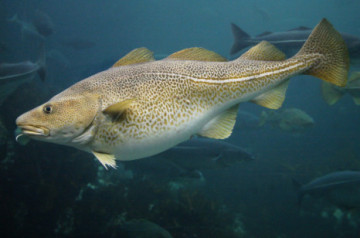 A new federal report says northern cod stocks off eastern Newfoundland continue to grow 25 years after a sweeping moratorium, but warns they remain in the “critical zone.” The Fisheries and Oceans Canada update concludes fishing should be kept to the lowest possible levels as a precaution. It finds that while total biomass was up seven per cent from 2015 to 2016, stocks are still at critically low levels. The report says there was a spawning biomass of about 300,000 tonnes in 2015. Fisheries biologist Karen Dwyer says a spawning biomass of about 900,000 tonnes would support a more extensive commercial fishery. Link 10:55
A new federal report says northern cod stocks off eastern Newfoundland continue to grow 25 years after a sweeping moratorium, but warns they remain in the “critical zone.” The Fisheries and Oceans Canada update concludes fishing should be kept to the lowest possible levels as a precaution. It finds that while total biomass was up seven per cent from 2015 to 2016, stocks are still at critically low levels. The report says there was a spawning biomass of about 300,000 tonnes in 2015. Fisheries biologist Karen Dwyer says a spawning biomass of about 900,000 tonnes would support a more extensive commercial fishery. Link 10:55
Western Pacific Regional Fishery Management Council seeks to Reopen Papahanaumokuakea to Fishing
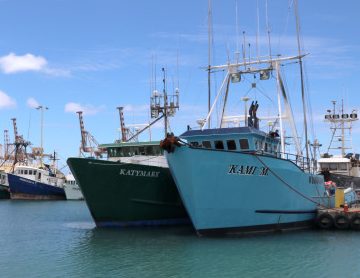 The Western Pacific Regional Fishery Management Council concluded its three-day meeting in Honolulu with a suite of recommendations, many of which are focused on keeping U.S. fishing grounds open to sustainably managed U.S. fisheries. The council includes the local fishery department directors from Hawaii, American Samoa, Guam and the CNMI, fishing experts appointed by the Governors and federal agencies involved in fishing-related activities. Marine national monuments, national marine sanctuaries, other marine protected area designations and Department of Defense training are among the uses that are increasingly closing off fishing grounds in U.S. waters. Council Chair Edwin A. Ebisui Jr. clarified that council communications to the administration about impacts of marine national monuments on fisheries are not lobbying. Some environmental activists recently made misleading statements about this in regards to a letter to President Trump prepared on March 1, 2017, by the Council Coordination Committee or CCC. The CCC includes the chairs of the nation’s eight regional fishery management councils. The letter details the impact of designations of Marine National Monuments under the Antiquities Act in the Atlantic and Pacific Oceans and was submitted to the president after conferring with the NOAA Office of General Counsel. To address the impacts of ever increasing fishing grounds being closed, the council agreed to the following: continue reading the story here 06:09
The Western Pacific Regional Fishery Management Council concluded its three-day meeting in Honolulu with a suite of recommendations, many of which are focused on keeping U.S. fishing grounds open to sustainably managed U.S. fisheries. The council includes the local fishery department directors from Hawaii, American Samoa, Guam and the CNMI, fishing experts appointed by the Governors and federal agencies involved in fishing-related activities. Marine national monuments, national marine sanctuaries, other marine protected area designations and Department of Defense training are among the uses that are increasingly closing off fishing grounds in U.S. waters. Council Chair Edwin A. Ebisui Jr. clarified that council communications to the administration about impacts of marine national monuments on fisheries are not lobbying. Some environmental activists recently made misleading statements about this in regards to a letter to President Trump prepared on March 1, 2017, by the Council Coordination Committee or CCC. The CCC includes the chairs of the nation’s eight regional fishery management councils. The letter details the impact of designations of Marine National Monuments under the Antiquities Act in the Atlantic and Pacific Oceans and was submitted to the president after conferring with the NOAA Office of General Counsel. To address the impacts of ever increasing fishing grounds being closed, the council agreed to the following: continue reading the story here 06:09






